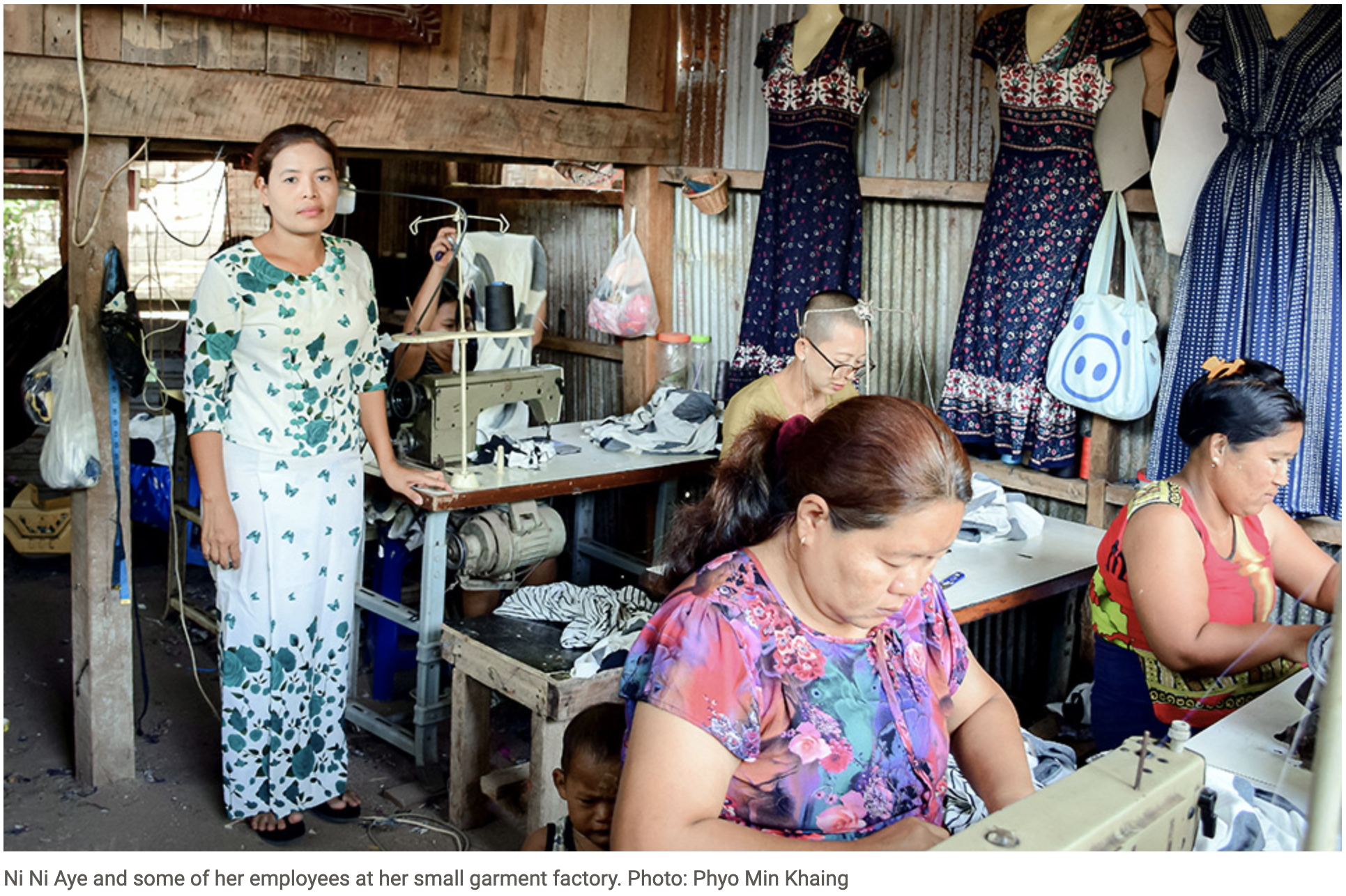
Ni Ni Aye's return to Myanmar: From migrant factory worker to businesswoman
Ni Ni Aye says she dreamed of starting a clothing business back in Thailand ever since she started working in Thailand. “I remitted half of my salary to my parents and I saved the other half for my dream business.”
After 11 years away, Aye returned to Myanmar in 2014 pregnant and with around 10 million MMK (USD 6,075) in savings. She spent most of that on a house and used 1,500,000 MMK to start her sewing business in 2015. She felt that she was at her best when sewing, and also felt confident that she had learned to be punctual, systematic and disciplined.
She eagerly participated in the Start and Improve Your Business Training conducted by the Migration Monitoring Group (MMG) and Foundation for Education and Development (FED), two organizations enhancing the empowerment and well-being of returned migrant workers in Myanmar. The training was part of an economic empowerment programme for returned women migrant workers in Cambodia, Lao People’s Democratic Republic and Myanmar, led by Atikha Overseas Workers and Communities Initiative, in partnership with UN Women.
The programme includes building capacity of local non-governmental organizations to provide reintegration support for returned women migrants. The capacities they acquire include reintegration counselling as well as training and referral for returned women migrants to start or scale up their businesses. This initiative was implemented under the PROMISE project (Poverty Reduction through Safe Migration, Skills Development and Enhanced Job Placement in Cambodia, Lao People’s Democratic Republic, Myanmar and Thailand), which is supported by the Swiss Agency for Development and Cooperation (SDC).
So far, 179 returned women migrants in the three countries of implementation participated in the trainings during October 2020 to April 2021, and 31 of them have been able to either start or scale up their businesses amidst the economic downturn resulting from the COVID-19 pandemic.
“I gained a lot of knowledge about business,” said Aye. “My favourite was learning about income, expenditure and profit calculation. I learned that if I invest 300,000 MMK, it is possible to earn a profit MMK150,000. I also learned that I should manage and divide my profit into three parts: a part to pay myself, another part for business expenses and the third part for future investments.”
She faced the challenge of handling a growing business and taking care of her family at the same time. “I have a son and an elder sister who lives with me. We share family responsibilities at home. I make the clothes to be sold. I make sure I have breakfast, lunch and dinner with my son. But it is good that I have my elder sister who helps me take care of him. She also lends me a hand in packaging the clothes that I have sewn.”
Aye’s business did well after the training. Before, she had two sewers, and sales of MMK 700,000 a month, with MMK 250,000 profit. Since the training, she has expanded her product line and now exports clothes through her other sister in Bangkok. Currently, she has four staff and she is making sales of MMK 1,500,000 and net profit of MMK 500,000 a month.
“I know I’m good at making clothes,” she said. “With more capital, I know I can expand.” Recently, Aye received a loan of MMK 500,000 from the SME Loaner-Lotus Bridge Group, facilitated by her mentors from MMG.
Following the coup in Myanmar, Aye has some concerns about how the recent political and civil unrest might affect her, her family and her promising business in Myawaddy, in the south-east of the country. But she remains overall optimistic.
“When I started the business, I expected it to provide only for our accommodation and food, just enough for me and my family to survive,” she said. But “the training made me believe that I can become a good businesswoman and earn a lot more.”
“Aye and other successful migrant returnees saved the necessary capital for their businesses before returning home,” said Atikha Chairwoman Estrella Mai Dizon-Añonuevo. “All successful women migrant returnees also engaged their families to take active part in managing the household, finances, and business.”
“Following COVID-19 disruptions, there is an urgent need for gender-responsive reintegration,” said Nansiri Iamsuk, UN Women – PROMISE Programme Coordinator. “And given existing gender norms, options for the women are more limited than those of men. The trainings under PROMISE is one way to enhance women’s empowerment.”
“But for reintegration to be sustainable, all stakeholders must be actively involved in policies and programmes, including civil society, employers’ organizations, the private sector and workers’ associations,” she added.
Link and Photo Source: https://asiapacific.unwomen.org/en/news-and-events/stories/2021/06/from-migrant-factory-worker-to-businesswoman